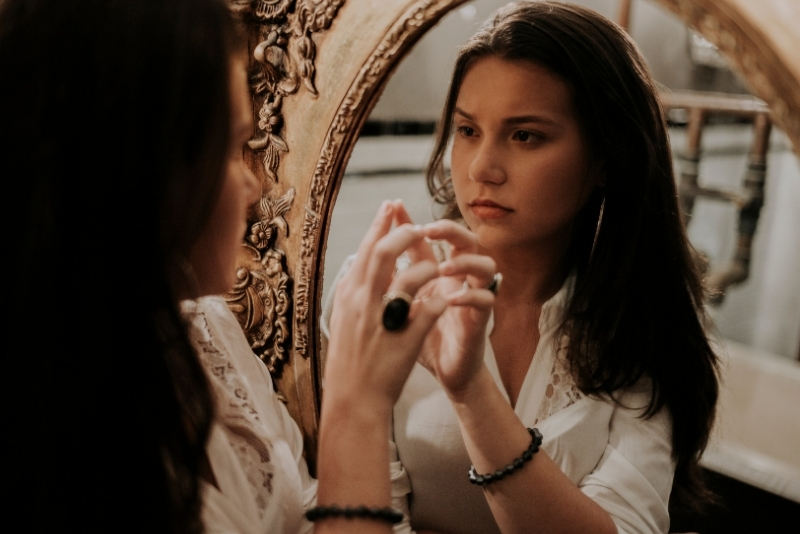Let’s be real—healing is messy, tender, and often lonely. And when you’ve had to do it more than once?
Whew. You stop waiting for someone to come save you. You learn how to carry yourself through the worst of it, even when your knees shake. You develop little rituals. Protective quirks. Quiet habits that don’t scream, “Look at me, I’m healing!”—but instead, whisper, “I’ve been through it… and I’m still here.”
I’ve done this kind of healing. More than once. And maybe you have too. So let’s talk about the subtle things we do now—the tiny, everyday ways we protect our peace, check in with ourselves, and guard that soft little heart we worked so hard to mend.
Here are 22 quiet habits I’ve noticed in myself (and women like me). Maybe you’ll see some of yourself in here too.
1. She talks to herself more than she admits
Okay, confession time—I talk to myself constantly. Not just the occasional “Where did I put my phone?” but full-on pep talks, reality checks, and gentle scoldings. I’ll literally pause mid-panic and whisper, “Girl, we’ve survived worse. Breathe.” It’s like having a built-in therapist who knows esattamente what to say because… she’s me.
This habit didn’t start out cute, though. It came from being alone during some of my darkest moments. There was no one else to soothe me, no hand to hold. So I became my own comfort. And over time, that inner voice went from shaky and self-critical to warm and grounding. Now, she cheers me on, talks me off emotional ledges, and reminds me of my worth when I start forgetting.
People might think it’s weird, but honestly? I think more of us do it than we admit. Talking to myself keeps me anchored. It’s how I process emotions, rehearse boundaries, and remind myself that I’m safe—even when the world feels anything but. If you catch me muttering at the steering wheel or whispering affirmations in Target… no, you didn’t.
2. Her mornings are sacred
Before life starts demanding things from her, she gives something to herself. That’s the golden rule of her mornings. She doesn’t scroll or talk or check her email in bed anymore. No. Those first few moments are a soft landing. A daily chance to breathe before the world barges in.
For me, it’s sipping warm lemon water while the sun slips through the curtains, or journaling with whatever sleepy thoughts are floating in my head. Some mornings, I just sit with my hand over my heart, not thinking, not planning—just existing. That stillness has become essential. Like a quiet reset button for my nervous system.
The girl I used to be used to wake up in a rush, immediately chasing productivity, deadlines, people-pleasing. But now? I move slowly. On purpose. Because healing taught me that peace isn’t something you find—it’s something you pratica. And that practice starts when your eyes first open.
This kind of morning isn’t glamorous or Instagram-worthy. It’s quiet. Intentional. It says, “I’m not abandoning myself today.” And that little choice? It changes everything.
3. She doesn’t overshare—anymore
Whew, this one was a tough lesson. I used to treat vulnerability like currency—if I shared enough of myself, maybe people would love me deeper, stay longer, understand better. Spoiler alert: they didn’t. Not always. And each time someone mishandled my softness, it chipped away at me.
Now? My story is sacred. I’ve learned that not everyone has earned the right to hear my deepest truths. I still believe in being open—but only with people who’ve proven they can hold my heart gently. These days, I take my time. I feel people out. I listen more than I speak. And when I fare share, I do it from a place of clarity, not desperation.
It’s not about being guarded—it’s about being wise. When you’ve had to piece yourself back together more than once, you stop handing over the instructions on how to break you. That doesn’t mean I’m cold or distant. I still laugh loudly, cry easily, and love hard. But I’ve learned to let people guadagnare their way in.
Protecting your energy isn’t selfish, babe—it’s sacred. Oversharing used to be my way of trying to connect. Now? I know real connection doesn’t need to be loud. It just needs to be safe.
4. She reads between the lines—always
You know that gut feeling you get when someone says “I’m fine,” but their eyes are screaming something else? Yeah. She catches that. Every time. She notices the long pauses, the fake smiles, the shift in someone’s tone when their heart isn’t in it. It’s not that she’s trying to overanalyze—it’s just how she’s wired now.
After getting hurt by what wasn’t said just as much as what è stato, she became fluent in subtleties. Texts without emojis, delayed responses, energy that suddenly feels… off. She picks up on it. Quietly. No confrontation, no drama. Just silent observations filed away under: “Pay attention.”
It’s a survival skill she didn’t ask for. Reading between the lines means she rarely gets blindsided anymore. She’s seen how people pretend, how they deflect, how they hide things they’re not ready to face. And while it can be exhausting, it also helps her protect her space.
So if she seems to sense something before you say it—she probably already knows. It’s not mind reading. It’s emotional intelligence, sharpened by heartbreak, polished by experience. And once you’ve developed that radar? You can’t exactly turn it off. Nor would she want to.
5. She creates joy in tiny, intentional ways
Big joy is lovely—vacations, milestones, celebrations. But she doesn’t wait for those anymore. She’s learned to find it in the tiniest corners of life. Like a fresh set of clean sheets. The first sip of iced coffee on a warm day. A favorite song from 2012 randomly playing in the grocery store. That kind of joy? That’s her favorite kind.
There were times she went so long without feeling qualsiasi cosa that now, she grabs joy wherever she can find it. I once bought myself flowers after a terrible therapy session. Not because I felt better, but because I needed something beautiful to hold onto. And you know what? It helped.
She lights candles for no reason, dances while making eggs, laughs at her own jokes. It’s not performative. It’s medicine. Little rituals like that remind her she’s still alive, still capable of smiling—even when things are heavy.
She doesn’t need a reason to celebrate anymore. Being here, still breathing, still soft after everything? That’s reason enough. Her joy is no longer an event—it’s a quiet rebellion. A whisper to the universe: You didn’t break me.
6. She’s obsessed with protecting her peace
Diciamo che her tolerance for chaos has dropped dramatically. There was a time when she’d stay in messy conversations too long, bend over backwards to “keep the peace” while losing her own, and say yes when her whole body screamed no. Not anymore.
Now? Peace is non-negotiable. She’ll block, mute, walk away, cancel, unplug—whatever it takes. She doesn’t do drama. She doesn’t chase explanations. She doesn’t argue with people committed to misunderstanding her. The version of her who did all that? She’s retired.
And look, this doesn’t mean she’s cold or avoidant. It means she knows what overstimulation, burnout, and emotional fatigue feel like—and she’s not going back there. So she’ll pick the calm option every time. She’ll stay home instead of forcing small talk at a crowded party. She’ll leave texts on read if they drain her energy. She’ll choose silence over noise.
Peace isn’t just a vibe. It’s her anchor. Her sanctuary. The thing she fought like hell to find. And now that she’s found it? She’s not letting it go for anything—or anyone.
7. She forgives, but she remembers
She’ll let go—for her own sake. That’s something healing taught her early: carrying anger is way too heavy, and bitterness? Exhausting. So she forgives, not because someone apologized (they often didn’t), but because she needed to breathe again.
But let’s be clear—she doesn’t forget. That whole “forgive and forget” thing? Yeah, no. She forgives e remembers. Not to hold grudges, but to hold boundaries. She recalls how it felt to be dismissed, lied to, betrayed. And she uses those memories as markers: This is what we’re not doing again.
I used to feel guilty about that. Like remembering someone’s hurtful behavior meant I wasn’t healed. But now? I see it as wisdom. You can’t grow if you pretend the fire never burned you. You learn. You adjust. You keep your heart open, but your eyes sharper.
Forgiveness is a gift she gives herself. Memory? That’s the map that keeps her from getting lost in the same dark woods twice.
8. She romanticizes the heck out of her life
Picture this: she’s walking to the grocery store with earbuds in, pretending she’s in a coming-of-age movie. The sunlight hits her cheek just right, and in her mind? That’s the final scene before the credits roll. That’s how she moves through the world now—like every little thing matters. Because it does.
After spending too many days just trying to get through, she now chooses to really dal vivo—even in the mundane. She lights incense while she cleans. She pours her coffee like she’s in a Parisian café. She’ll wear lipstick to the post office if the mood strikes. Not for anyone else—for herself.
When healing feels endless and exhausting, creating these tiny moments of beauty becomes a lifeline. They give the hard days some softness. She doesn’t need big, sweeping gestures—she needs fairy lights, her favorite mug, and a playlist that makes her feel something.
Romanticizing life doesn’t mean ignoring the hard stuff. It’s about finding magic in spite of it. She’s not pretending everything is perfect—she’s choosing to see the poetry in the imperfection. And honestly? That choice keeps her going.
9. She says “no” without the guilt now
This one? Took anni. Because once upon a time, “no” came wrapped in apologies and over-explaining. She’d say yes to things that drained her, just to avoid disappointing people. Sound familiar? Yeah. But not anymore.
Now, she protects her energy like it’s holy—because it è. She’ll say no to dinner plans when her social battery is fried. No to favors that require emotional gymnastics. No to being the default emotional support system for people who disappear when lei needs something.
And here’s the kicker: she doesn’t feel bad about it anymore. At first, she did. Her voice would shake, and her stomach would knot. But with time, she realized that her peace matters more than people-pleasing. That her “no” is a full sentence, not a negotiation.
I remember the first time I said “no” without an excuse—it felt like rebellion. But also? Freedom. Saying no is how she keeps space in her life for the things (and people) that davvero matter.
She’s not selfish. She’s self-aware. And if someone can’t handle her boundaries? That’s not her burden to carry.
10. She needs alone time like oxygen
Don’t get her wrong—she loves people. Loves laughing until her stomach hurts, deep conversations over wine, cozy nights in with her ride-or-dies. But after all that? Lei esigenze solitude to recharge. Not just want—necessità.
Alone time used to feel like loneliness. Now, it feels like home. It’s where she checks in with herself, realigns, decompresses. It’s not a retreat from the world—it’s a return to herself. Her rituals when she’s alone? They’re sacred. A long bath with a book. Dancing around the kitchen in pajamas. Journaling at 2am when her thoughts won’t let her sleep.
Healing taught her that presence with herself is the foundation for everything else. If she’s not grounded within, she can’t show up fully for anyone else. So she guards that solitude like a lioness.
Sometimes people don’t get it. They call her distant or too independent. But she’s not isolating—she’s honoring. Her peace, her rhythm, her needs. She’s found strength in her own company, and there’s something quietly powerful about that.
Solitude isn’t silence. It’s self-connection. And once she tasted that kind of intimacy with herself? She never looked back.
11. She double-texts herself more than anyone else
Okay, hear me out. While she’s texting friends back (sometimes late, because life), she’s also deep in convos… with herself. And I don’t mean in a weird way. I mean she’s constantly checking in through notes, voice memos, random journal entries, and those long mental lists that live in the notes app.
She’ll text herself reminders like, “Don’t ignore your gut again” o “You don’t owe them a response just because they reached out.” Sometimes it’s a list of things she’s proud of. Sometimes it’s just a gentle “You’re doing great, babe.”
Because when she was falling apart and had no one to confide in, she became her own soft place to land. And now that she’s healing? That relationship with herself is still the most solid one she’s got.
It’s not about being self-absorbed—it’s about being self-aware. She documents her thoughts, moods, patterns. She tracks her triggers and celebrates her wins. It’s how she stays grounded.
Double-texting herself isn’t narcissistic—it’s nurturing. She’s learning how to be her own safe space. Because if anyone deserves love notes and late-night encouragement? It’s her.
12. She celebrates her quiet wins like loud ones
Once upon a time, she only celebrated things that looked impressive on paper—promotions, big changes, relationship milestones. But now? She throws little inner parties for things like not texting her ex when she really wanted to, or getting out of bed when the anxiety was loud.
Because those quiet wins? They’re the foundation of everything.
I once gave myself a full skincare routine and a glass of wine just because I finally told someone no without overthinking it for three hours. That’s where she’s at now. Progress isn’t always visible. Sometimes it’s internal, invisible, and deeply personal. And she celebrates it anyway.
No one else may notice these victories—but lei does. She’s been through enough to know that the battles in your head can be just as hard as the ones outside of it. And every time she chooses herself, even in the smallest way, it deserves recognition.
So she claps for herself. She hypes herself up. Because waiting for someone else to notice? That was the old her. The healed version knows that growth doesn’t always roar. Sometimes, it’s a whisper that says, “We’re doing better.”
13. She notices when her body’s trying to tell her something
Gone are the days of ignoring the headaches, brushing off the tight chest, or pushing through the fatigue with caffeine and denial. Now? She listens. Closely.
She’s learned the body keeps score—of stress, sadness, anxiety, even unspoken resentment. That knot in her stomach? It’s not random. That racing heart? It’s a signal. She no longer treats discomfort as an inconvenience—it’s information. And the girl she used to be? She pushed through it. But this version of her… she pauses. She checks in.
I’ve had full days derailed by unexplained exhaustion, only to realize later: my spirit needed rest, not a to-do list. She’s learned that healing isn’t just emotional—it’s physical, too. Now, she stretches after long days, drinks water like it’s a love language, and lets herself rest without shame.
She no longer sees rest as lazy or indulgent. It’s sacred. Preventative. Wise. Because ignoring her body used to lead to breakdowns. Now, she catches the whispers before they become screams.
14. She quietly cuts ties with people who drain her
No dramatic unfollowing, no long texts or final monologues. Just a slow fade. She doesn’t announce her exits anymore—she just leaves. Peacefully. Quietly. Because she’s realized that explaining herself to people who don’t davvero see her is a waste of breath.
She used to keep people around out of loyalty, nostalgia, or sheer guilt. But healing taught her that proximity doesn’t equal connection. If being around someone leaves her feeling smaller, anxious, or off-balance, she trusts that feeling now. And she acts on it.
I’ve walked away from years-long friendships because the energy shifted and the mutual care dried up. Was it sad? Of course. But it was necessary. And she knows that now. Some people aren’t meant to go with you where you’re headed—and that’s okay.
So if she stops reaching out, stops showing up, stops explaining? It’s not shade—it’s self-preservation. She doesn’t hate you. She just loves herself more now.
15. She rewrites the stories she used to believe about herself
You know those old narratives we carry? “I’m too much.” “I’m not enough.” “I always mess things up.” She’s rewriting those now—one quiet, intentional sentence at a time.
Those lies were planted by people who didn’t know how to love her—or by a version of herself who didn’t know better yet. And for a while, she believed them. Built her self-worth around them. But healing cracked those stories open. Gave her permission to ask: Is this really true? Or just something I was taught to believe?
Now, she talks back to those voices. She replaces “I’m too sensitive” with “My feelings are valid.” “I always attract the wrong people” becomes “I’m learning how to choose better.” She’s not pretending the past didn’t happen—she’s just not letting it script her future.
It’s like renovating a house she used to live in. Same structure, but fresh walls, softer lighting, new rules. And every time she reclaims a piece of her story, she steps more fully into the woman she’s becoming.
16. She lets herself feel everything—even when it’s inconvenient
She no longer shoves emotions down or tries to “positive vibe” her way out of pain. If she’s sad? She cries. If she’s angry? She lets herself feel it. If she’s grieving something no one else sees? She honors it anyway.
There was a time she felt like emotions made her weak or dramatic. Now, she sees them as proof she’s alive. Healing made her realize that ignoring her feelings didn’t make them go away—it just buried them deeper, where they turned into anxiety or self-doubt.
I’ve had full-blown crying sessions over things other people would brush off. But you know what? I felt lighter afterward. There’s something deeply powerful about saying, “This hurts,” without minimizing it. She lets her heart stretch wide now—even when it aches.
She doesn’t apologize for her feelings. She makes space for them. Processes them. Moves through them. Because emotions aren’t the enemy—they’re the roadmap back to herself.
17. She surrounds herself with softness
Not just in people, but in her environment. Her space is a sanctuary now. Cozy blankets, low lighting, scents that soothe her nervous system. Music that makes her exhale. Books that remind her she’s not alone.
After years of chaos—external or internal—she craves softness in every sense. She gravitates toward people who are gentle with her heart, conversations that feel like warm tea, and routines that ground instead of overwhelm.
I used to live in clutter and noise because I didn’t think I deserved better. Now? My space mirrors how I want to feel: safe, calm, held. She doesn’t need constant stimulation or excitement—she needs intention. Peace. A place to land.
She’s curating her life with care now. Saying no to anything that feels harsh, rushed, or unkind. Because healing showed her how deeply her surroundings impact her spirit—and she’s never ignoring that again.
18. She laughs at the darkest stuff (sometimes inappropriately)
Look, when you’ve been through hell a few times, your sense of humor gets… dark. And she’s okay with that. Laughter has become a pressure valve—a way to release the weight without collapsing under it.
She’s the type to make a joke about her trauma mid-convo, then follow it up with, “Too soon?” It’s not that she’s dismissing the pain—it’s that humor is how she survives it. It’s how she flips the narrative, how she regains control of stories that once broke her.
I’ve laughed in therapy sessions, at funerals (quietly), and during some of the most emotionally charged moments of my life. Because sometimes? You either laugh or cry. And she’s learned to do both. Often within the same five minutes.
Her laughter isn’t always light—it’s layered. Earned. Sacred. It says, “This didn’t kill me. And now I get to laugh about it.” That kind of humor? It’s healing in disguise.
19. She believes in second chances—but not always for the same people
She’s got a soft heart. Still believes people can change. Still roots for the underdog. But she’s also not foolish. She’s learned that second chances are a privilege, not a guarantee.
So yes, she’ll give them. Sometimes to herself. Sometimes to people who genuinely show up differently. But she no longer hands them out just because someone said they were sorry. Words are cheap—she watches for cambiamento ora.
There’s power in discernment. In knowing that forgiveness doesn’t have to equal reunion. That boundaries aren’t punishments—they’re proof that she values herself. And if someone shows up the same way they did last time? She walks.
I’ve given second, third, and fourth chances in the past. Now? I give myself the first one. To choose better. To pause. To protect my energy instead of throwing it into black holes.
She believes in growth. But she also believes in self-respect. And balancing the two? That’s her real glow-up.
20. She knows healing isn’t linear—and that’s okay
Some days, she’s on top of the world. Others? She’s back in the weeds, triggered by something small and spiraling into old patterns. But here’s the difference: she doesn’t shame herself for it anymore.
Healing isn’t a straight line. It loops. It dips. It backtracks. And for a while, she thought setbacks meant failure. Now? She sees them as part of the process.
I’ve had days where I felt like I was done healing—only to find myself crying over something I thought I was “over.” But instead of freaking out, I said, “Okay, what still needs love here?” That shift in mindset? Everything.
She doesn’t chase perfection now—she honors progress. She understands that being triggered isn’t regression, it’s revelation. It’s her inner world saying, “There’s more to tend to.” And that’s okay.
She’s learned to meet herself with grace, not judgment. To see healing not as a destination, but a rhythm. Some days it flows. Some days it stings. But either way, she keeps showing up. Quietly. Bravely. Lovingly.
21. She pre-grieves things before they’re even over
She’s the kind of woman who starts mourning people while they’re still in her life. Not because she wants to—but because her nervous system has learned to prepare for loss. She notices the shift in tone, the delayed replies, the energy that used to feel safe turning slippery. And instead of pretending it’s not happening, she lets herself feel it early.
Pre-grieving is how she protects her heart from the shock of the final blow. It’s the quiet way she loosens her grip before something slips away. A slow, gentle detachment. Not cold—just prepared. It might seem dramatic from the outside, but for her, it’s survival.
Because when you’ve had the rug pulled out enough times, you stop pretending people will always stay. You hope they will. But you also pack your emotional bags just in case. Not because you’re jaded—but because you’ve learned to love with your eyes open.
22. She triple-checks her boundaries—especially when she’s happy
Sounds backwards, right? But for her, happiness used to come with a price. Every time she felt light, soft, open—something came along to shatter it. So now, even in joy, she double-checks: Am I honoring my limits? Is this safe joy or borrowed joy? Am I shrinking just to keep the peace?
She’s not trying to sabotage her happiness—she’s trying to protect it. Old versions of her let people walk all over her in the name of love, peace, belonging. This version? She still loves, but not at the expense of herself.
Joy is sacred now. And she doesn’t let just anyone sit at the table where she’s finally learned to feast. So if she pauses mid-happiness to check her boundaries, it’s not fear—it’s wisdom. She’s finally learned that peace isn’t just about what you say no to, but what you say yes to with full, rooted clarity.























